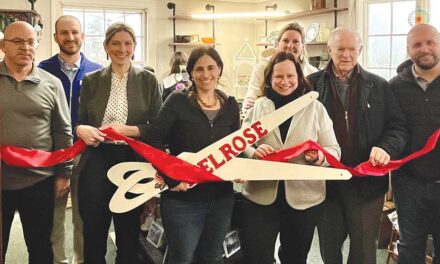Published September 13, 2019
By GAIL LOWE
MELROSE — Watching a loved one die from a smoking-related illness became a life-changing experience for Millane Mosqueda, member of the graduating Class of 2020 at Melrose High School.
“A close relative and neighbor died of a lung disease. But before her death, she had to wear scarves to hide the hole in her throat that helped her breathe because she had been a chain smoker,” said Mosqueda, who immigrated with her family to the U.S. from the Philippine Islands in 2013.
At the time, witnessing such a catastrophic medical event shocked the young girl, but she had no idea it would have so much influence on her life.
During her sophomore year at the high school, she joined 84th Movement, a tobacco preventative organization in Massachusetts. Ever since, she has since worked as one of its statewide leaders.
At the end of the 2019 school year, Mosqueda’s coordinator Danielle Adams from 84th Movement nominated her to submit an application to Campaign for Tobacco-Free Kids (CTFK) whose purpose is to stamp out tobacco use worldwide. Once she was accepted, she was required to submit a video statement.
Mosqueda said she is “very honored” to be part of CTFK because she now has a larger platform to advocate for tobacco prevention. She believes she may have been chosen to represent Massachusetts because of her passion for ending the battle that has plagued many communities for decades.
“I am outraged (over what I’ve learned),” she said about tobacco use and its long-term effects. “It’s important to have youth leaders to influence their peers and get the movement going.”
Mosqueda explained that although the Philippine Islands has legislation prohibiting the selling of tobacco to minors it has not been strongly enforced. For instance, convenience store employees often look the other way.
“Children as young as five years old are able to buy cigarettes for their parents,” Mosqueda said. “This is what I witnessed when I lived in the Philippines.”
On a more personal level, she had no idea how to help loved ones quit tobacco use because she was taught to ignore the problem and refrain from any discussions concerning it.
When the opportunity arose in the U.S. to become part of the solution to nicotine addiction, she did not hesitate to get involved because she knew she could become a catalyst to prevent disease and heartbreak over the deaths of loved ones.
Through her involvement in 84th Movement and CTFK, Mosqueda has learned that no one is to blame but the companies that manufacture smoking materials.
“For years, users were scorned by society because of their addiction, but they are victims who were tricked and then trapped,” Mosqueda pointed out, adding that the tobacco industry designed usage that would attract people to their products, including the offer of a pleasant taste, inexpensive cost and easy access.
“This is especially evident in the black community where menthol cigarettes have dominated their culture,” she commented.
The 2019 summer was a hectic one for Mosqueda but also one of the best she has ever experienced. “I was lucky that summer started early for me,” she said, adding that she spent some of the first few weeks with family and going to the beach and Canobie Lake.
After a Fourth of July party, she prepared to travel to Washington, D.C. for the CTFK symposium. While there, she met with 27 other youths from around the nation who share her passion.
The youths were trained and prepared for legislative visits on Capitol Hill, which took place at the end of the second week in July. During the training, Mosqueda talked with the staff of Senators Elizabeth Warren and Edward Markey and United States Representative Katherine Clark to ask if they would co-sponsor the SAFE Kids Act (Senate) and Reversing the Youth Tobacco Epidemic Act (House).
“In between, we all enjoyed exploring the city and having a great time at the dormitories at George Washington University,” she said.
Her next excursion was to Cincinnati, Ohio with members of the high school’s Youth Action Team to attend the Truth Initiative Summit. While there, she met and networked with youth leaders and advisors.
“Ultimately, the purpose of the event was to prepare and plan for the National Day of Action, which will be held on Wednesday, Oct. 9,” she explained.
If all this were not enough, in August she spent most of her time preparing for her SATs at the home of her sister and while on a road trip to Mt. Washington in New Hampshire. She also participated in a retreat for the 84th Movement to welcome new members of the statewide leaders and to refresh their memories about the training received.
“We learned about tobacco targeting through the lens of racial justice and how people of color, the impoverished and members of the LGBTQ community are being targeted along with youth,” she said.
Soon after returning from New Hampshire, she traveled to Minneapolis, Minn. to participate in a panel discussion for Coordinator Camp as part of the National Conference on Tobacco or Health.
In addition to her contempt for tobacco, Mosqueda also believes that marijuana prevention is an important topic that needs further discussion. At the moment, however, she is focusing on advocating for tobacco prevention because she believes it is a bigger problem, one that takes a lot of time and energy.
“Smoking is harmful because it is so addicting. Even if people know the consequences of smoking they cannot stop,” she commented. “In most cases, once the brain is exposed to nicotine it only wants more. That’s why e-cigarettes could be as dangerous as commercial cigarettes. They change the brain chemistry of adolescents, leaving them to crave more of those harmful chemicals and carcinogens.”
The Truth Initiative’s National Day of Action on Oct. 9 will target the vaping industry to not test on humans, said Mosqueda.
“There are many Centers for Disease Control resources to help quit smoking,” she said. “The Truth Initiative also has a text program to help those addicted to vaping.”
According to Mosqueda, the long-term effects of vaping are still unknown because the practice is fairly new, but it is known that e-cigarettes contain dangerous chemicals that can lead to cigarette smoking. Already, there have been reported deaths as a result of vaping.
“The vaping companies are using kids as human lab rats to test their products and get them hooked to become life-long customers, replacing the population of customers who died of cigarette smoking,” Mosqueda said.
In spite of what looks like a grim future for experimenting adolescents, the Melrose High School senior remains optimistic.
“My generation has been smart about not using cigarettes, and in this state the smoking rate of high school students has decreased to six percent,” she said. “But there’s still a lot of work to do, especially with the growing rates of e-cigarette users. People need to be educated, the companies should be held accountable and lawmakers should work for the health and betterment of American lives. I am hoping that my generation will be the first to become tobacco-free.”
To view Millane Mosqueda’s statement, visit https://hyouthtu.be/gpuz4ntKAwM.
For more information, go to: https://www.durbin.senate.gov/newsroom/press-releases/durbin-murkowski-degette-raskin-introduce-bill-to-restrict-kid-friendly-flavors-in-e-cigarettes or https://energycommerce.house.gov/newsroom/press-releases/pallone-and-shalala-introduce-comprehensive-legislation-to-address-youth.




